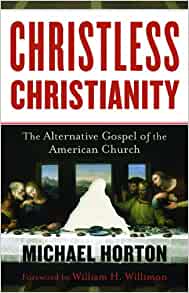Michael Horton is a seminary professor, magazine editor, talk-show host and prolific author. His latest book, Christless Christianity, is dedicated to ‘our Lord Jesus Christ, through whom we have now received reconciliation’ (Romans 5:11).
The antithesis between the dedication and the title nicely captures Horton’s point – whereas biblical Christianity is about Christ’s mediation between sinners and a holy God, the American church is trying to bypass Christ to meet God half-way and on its own terms. Like Christianity and Liberalism by J. Gresham Machen, Christless Christianity pulls few punches, preferring the way of stark contrasts instead.
Horton identifies Pelagianism (in one form or another) as a ‘default position’ to which we continually revert – a fact that leads some preachers to drift into ‘Law Lite’. For example, Joel Osteen is quoted as saying, ‘I know I’m not perfect, but … I’m doing my best to please Him’. This is followed up by further law in place of the gospel, which takes the form of ‘good advice’ in place of ‘Good News’.
Horton critiques therapeutic moralism, rampant individualism, gnosticism and subjectivism – directing us away from asking, ‘What would Jesus do?’ to contemplate ‘What has Jesus done?’ He presents this emphasis as the antidote to the legacy of Charles Finney, which includes Willow Creek methodology and social activism. He calls instead for a church that will proclaim the everlasting gospel, dispense the sacraments (there is an apologetic for a Reformed view of the Lord’s Supper) and exercise discipline.
Horton repeats some of the work of David Wells on therapeutic and narcissistic culture, although he builds on this to provide an accessible, church-focussed response. It would be good for him to have interacted with ministers like Tim Keller who perhaps would see the church’s mission in broader terms.
It might be argued that Horton is too negative about experience and some readers may not share his fondness for non-evangelical sources of wisdom. Finally there is the question of how relevant the book can be to the British church.
However, this is a satisfying, challenging and even exciting analysis and call to ‘resistance’, making the effort to translate it into our own setting surely worthwhile.



